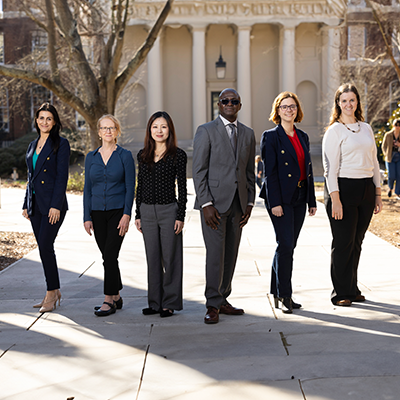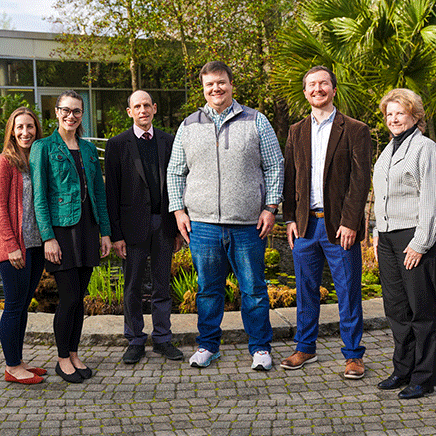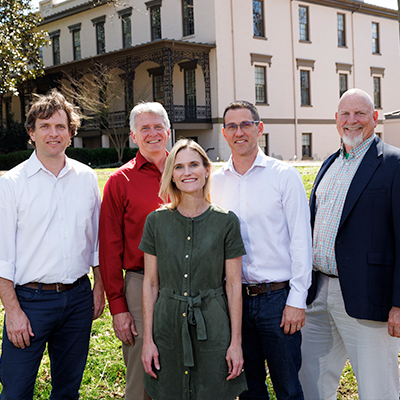Mark Risse is director of Marine Extension and Georgia Sea Grant and is the Georgia Power Professor of Water Policy at UGA. With a Ph.D. in biological and agricultural engineering, his expertise is in non-point source pollution management, water resources, stormwater management, coastal erosion processes and sustainable/resilient development. He has been central to the NSF proposal to establish an NSF Engineering Research Center for Sustainably Engineered Riverine-Coastal Systems at UGA. He also has been critical to developing the team’s relationship with a regional land conservation initiative led by the U.S. Department of Defense and state natural resources management agencies, setting the stage for eventual funding of a DoD-Sea Grant Liaison at UGA. Risse’s relationship-building efforts have also informed the team’s development of the NSF’s coastlines and people proposal to develop a resilience hub using the military-community interface as study areas. He was a key partner on the AT&T resilience grant.
Shana Jones, public service faculty at the Carl Vinson Institute of Government, is an attorney experienced in developing legal and policy guidance involving environmental and coastal issues. She partners with the Marine Extension-Georgia Sea Grant on coastal flooding issues, adaptation planning and hazard mitigation, managing the Georgia Sea Grant Law Program. She has been key to developing the team’s relationship with a regional land conservation initiative led by the U.S. Department of Defense, setting the stage for eventual funding of a DoD-Sea Grant Liaison at UGA. Her relationship-building efforts have also informed the team’s development of an NSF coastlines and people proposal to develop a resilience hub using the military-community interface as study areas. She is a faculty member for a recently funded Research and Development Cooperative Agreement with the Army Corps of Engineers and she served as the community connection with Athens for an AT&T Resilience grant.
Jon Calabria is an associate professor in the College of Environment and Design. His experience includes directing projects and plans that integrate conservation, restoration and mitigation within the human context. For more than three decades, he has completed award-winning projects across the various ecoregions (mountains to the sea) in the southeastern U.S. to improve environmental quality. As a practitioner and academic, his interdisciplinary approach has informed several of the team’s projects, including the Peacock Creek project implementation with Pippin. Calabria has contributed to the team’s development of the NSF’s coastlines and people proposal to develop a resilience hub using the military-community interface as study areas. He also is a key faculty member for a recently funded Research and Development Cooperative Agreement with the Army Corps of Engineers.
Don Nelson, a professor in the Department of Anthropology, has over 20 years of national and international experience in drought risk management, social vulnerability and participatory approaches to natural resource management. His work focuses on the human dimensions of climate variability, the role of scientific information in resource management, and how social and political relations shape decision-making and policy outcomes. A member of IRIS’s leadership team, Nelson co-leads project development and directs and conducts team research. He leads the team’s development of the NSF’s coastlines and people proposal to develop a resilience hub using the military-community interface as study areas. He is a key faculty member for the recently funded Research and Development Cooperative Agreement with the Army Corps of Engineers. Nelson also is central to the NSF proposal to establish an Engineering Research Center for Sustainably Engineered Riverine-Coastal Systems at UGA.
Brian Bledsoe provides significant professional and research expertise as well as leadership to the team’s activities. He directs the Institute for Resilient Infrastructure Systems at UGA, bringing university researchers together to collaborate and develop infrastructure projects that deliver a broad array of social, economic and environmental benefits. He is also a founding member of the Network for Engineering With Nature, a nationwide community of researchers and practitioners using nature-based solutions to build community resilience. On this team, Bledsoe instigates grant and project proposals, organizes and directs research teams, co-authors publications, intersects with national partners such as the Army Corps of Engineers, and sets the overall agenda for the partnership. With more than 30 years of experience as a civil and environmental engineer in the private and public sectors, Bledsoe brings technical expertise to team projects.
Scott Pippin, public service faculty at the Carl Vinson Institute of Government, is an attorney experienced in working with local governments, focusing on environmental matters and compliance with federal and state environmental policies. He earned an M.S. degree at the College of Environment and Design, where he studied green infrastructure and sustainable design. A member of IRIS’s leadership team, Pippin co-leads team project development, directs and conducts team research, and interfaces on projects between academic faculty and federal and state agencies, local governments and communities. His practical knowledge and experience integrates with the research capacity of team members, improving the research questions generated and better communicating ideas to practitioners. Pippin has been integral to developing the Research and Development Cooperative Agreement with the Army Corps of Engineers for outreach and engagement with military installations and communities to enhance resilience.




